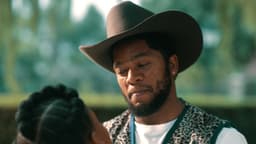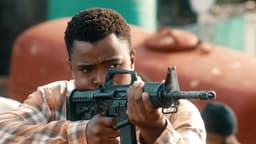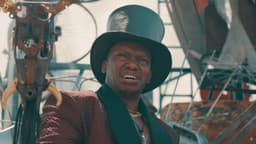
Director Jasyn Howes on true-crime documentary The ABC Killer
You can now binge The ABC Killer on Showmax. The twisty three-part series about Moses Sithole is already getting rave reviews. 5FM calls it “absolutely gripping” and Fortress of Solitude hails it as, “Another brilliant Showmax true-crime series… Showmax is here to remind you that South Africa has some of the most gripping crime stories in the world and some of the best people telling them.”
Watch the trailer for The ABC Killer
To find out more, we caught up with director Jasyn Howes, who also made the SAFTA-nominated Boetie Boer for the streamer.
This is your second Showmax true-crime series in a row set in the 90s and about a serial killer. What’s the attraction?
When I was researching Boetie Boer, I met Tamsen de Beer. She told me how, 30 years ago, she was a rookie journalist working the night shift at The Star newspaper when she received a life-changing call from someone claiming to be South Africa’s most prolific serial killer. I realised that could be its own documentary. So I didn't go and seek the story. It found me.
What intrigued you about Moses Sithole?

He was our Ted Bundy. He was South Africa’s most prolific serial killer, who targeted women of colour with the promise of work, in Atteridgeville, Boksburg and Cleveland. He’s currently serving 2 410 years in prison for 38 murders, 40 rapes and six robberies – all committed in the space of just over a year, in broad daylight, while sober.
What I found fascinating about him is that he came from nothing, no education, but he was innately smart. He had street smarts but he could also present himself in a way that he seemed educated. So many of the people we interviewed spoke about how they never would have guessed he was a serial killer.
He’s a clever guy. He’s been studying in prison: he’s already got a degree in theology and is currently studying law.
What does The ABC Killer add to the conversation about Moses Sithole?
When I researched Moses and what had been made about him, the only thing I could find were some podcasts and articles online and one American true-crime documentary from about 20 years ago.

The documentary only touched on Tamsen briefly but I thought she was the best vehicle to get into the story. I wanted to paint this picture of this woman at a very particular time in South Africa’s history, who is coming from a white, privileged perspective, who’s been immersed in this hedonistic rave scene, who then has her world views changed and her world broadened by being brought into the serial killer story, just by being in the right place at the right time.
I was also able to track down people in the story that have never had an opportunity to share their version of what happened. People like survivor Buyiswa Swakhamisu and detectives Frans van Niekerk and Paul Nkomo. Nkomo was never mentioned in any of the content around the story but he was pivotal to tracking down Moses Sithole, so it was great to finally give him a voice to share his side of what happened.
Our research also unearthed a lot. We had transcripts of the telephone conversations between Moses and Tamsen at The Star, as well as her diary entry from the night of the first phone call. And letters Moses wrote to clinical psychologist Dr Giada Del Fabbro, who interviewed him for her PhD on South African serial killers. And video footage of Moses being interviewed by the SAPS in One Military Hospital in 1995 and by a fellow inmate in Boksburg Prison in 1996, who planned to sell his story.
Buyiswa’s story is so powerful. Talk us through that interview.

This happened to her in 1989 and she still carries the trauma of that event to this day. You see it in the documentary.
Initially she wanted her identity concealed. But when we arrived at her house and she saw our faces and we embraced, she felt a complete shift and she felt compelled to be brave and to reveal her identity and to stand strong and be like, “You know what? People need to know the story. People need to know what happened to me. People need to know who this man was, and I need to be brave, not just for myself. I need to be brave for other women that have been through these situations, that didn't speak up, that didn't say anything.”
Because she was brave enough to go to the police and say something. And she was brave enough to go and chase after him when she saw him again. It must have taken so much courage to do that.
What did you do differently this time compared to Boetie Boer?
We wanted to make it tighter, with fewer episodes and better pacing.
This time, many of the reenactments take place in their real-world locations. Everything you see at The Star is at The Star. The re-enactments of the trial were filmed at the actual courtroom.
I grew up in Joburg and it was really interesting to see how little things have changed in many of these locations. Everything is kind of stuck in a time capsule.
You met Stewart Wilken, aka Boetie Boer. Did you get to meet Moses?
No, but I did get to have a 40-minute phone call with him.
I know my work is going to have an impact on them and their relatives, so I feel like it’s only right for me to go and have an open and honest discussion with them.
Obviously there was a level of skepticism but he was open to talking to me. I don't think he receives many phone calls.
We ended the call with the intention of talking again but then he got spooked.
I would have liked to meet him. You can read and hear what other people say but I want to meet the person and understand the nuances of who they are. And to know if there’s been any meaningful change in them.
In Boetie Boer, we went into Stuart Wilken’s backstory and what shaped him into a killer. This time, we’ve left Moses more of an enigma.
What did this case mean to South Africa at the time?
We’d just had the first elections and Mandela was trying to unify South Africa. He used the 1995 Rugby World Cup as an opportunity to bring the people in South Africa together behind a common cause for good. And this case was very similar in that way because it brought together a newly multiracial police force and investigative team and showed that they could work together and do the right thing and get the job done, at a time when there was very little trust in the police.
Watch The ABC Killer on Showmax.
More like this

Brakpan Chronicles S1
What is true about the town of Brakpan and what is fiction? Do the jokes about this place have any basis in reality? In this two-part documentary, we aim to find the real Brakpan, the place that exists beyond the memes.

South Africa’s stories and storytellers recognised as SAFTA nominees announced
Mzansi’s boldest stories take centre stage as the 2026 SAFTA nominees are unveiled, with a wave of nominations across DStv and Showmax.

Billy Joel: And So It Goes (2025)
An honest, insightful, and deeply moving look at the life and career of acclaimed musician Billy Joel, covering both his struggles and triumphs.

Surviving Mormonism with Heather Gay S1
Former RHOSLC cast member Heather Gay investigates hidden truths within the Mormon church, exposing cracks in its perfect facade.

Brakpan Chronicles: Die mense sê, kom in
The two-part documentary series Brakpan Chronicles, by Rian van Heerden and Provoco, will premiere soon on Showmax.

Wizkid: Long Live Lagos (2025)
This intimate and uplifting documentary explores Grammy-winning Nigerian artist Wizkid's rise to superstardom as one of the biggest Afrobeats artists.

Law & Order Toronto: Criminal Intent S1-2
This spin-off of the hit crime drama franchise follows an elite squad investigating corruption and high-level white-collar crime in Greater Toronto.

Helderberg S1
South Africa suffered its worst air disaster in 1987. The hunt for the truth about what happened to SAA Flight 295 is still on almost 40 years later.
Outlaws, now streaming on Showmax
Go on holiday with RHUGT: Africa
Showmax is the home of HBO in Africa

What to watch on Showmax in March 2026
Local gems, Showmax Originals, international hits and intriguing documentaries await Showmax viewers in March.

Dangerous Animals (2025)
A tense, twisted and jaw-dropping survival horror. When a surfer is abducted by a shark-obsessed serial killer, she must escape before he performs his sadistic shark feeding ritual.

The Neighborhood S1-8
When Dave Johnson and his family arrive from Michigan, they're unfazed that their new dream home is located in a community quite different from their previous small town.

Brakpan Chronicles S1
What is true about the town of Brakpan and what is fiction? Do the jokes about this place have any basis in reality? In this two-part documentary, we aim to find the real Brakpan, the place that exists beyond the memes.
Latest Stories

What to watch on Showmax in March 2026

Bad Girls Bootcamp S1

Schalk Bezuidenhout trades stand-up for 9-5 in Die Kantoor

A heartbreaking loss: Nolwandle Biyela’s final stand in Outlaws Season 2

Fall in love with romantic drama Touch, now on Showmax

Antonie Marx on Volspoed and why it's a must-watch

Sandra Stein makes her debut on Law, Love and Betrayal S2

Albert Pretorius on Die Kantoor, SA’s re-imagining of The Office

20+ addictive South African reality shows to stream

Where to watch The Real Housewives franchise online

How to Train Your Dragon: Bringing Hiccup and Astrid to life

What to watch on Showmax in January 2026

7 things to know about indie award-winning movie Dìdi

Mission: Impossible – The Final Reckoning’s South African stunts

Die Kwiksilwers (2024)

Where to see the cast of Mpondoland on Showmax

Angel on The Real Housewives Ultimate Girls Trip, Jojo and more

Thandolwethu Zondi on his new role in Outlaws S2
Must-watch trailer for Showmax's turbo-charged reality series Volspoed

The Real Housewives Ultimate Girls Trip cast on first impressions, beefs and more

Fana Mokoena on playing a sangoma in Masinga

Princess Jecoco on The Real Housewives Ultimate Girls Trip Africa

Tlali returns: Outlaws’ most loved and hated villain is back

Novocaine: the US box office hit shot in Cape Town







